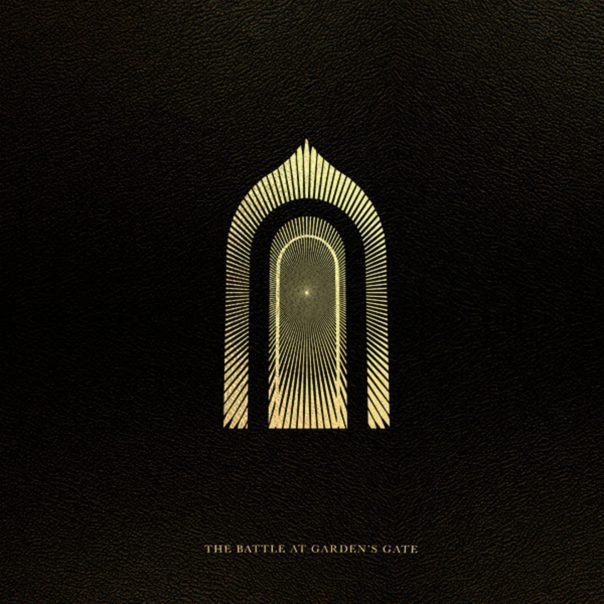ALBUM REVIEW: Greta Van Fleet rushes things on ‘The Battle at Garden’s Gate’

Following the success of debut LP Anthem of the Peaceful Army, in 2018, Greta Van Fleet suddenly arrived at the golden gates of rock and roll superstardom. But that arrival was met with mixed reactions. Some fans heard the Frankenmuth, Michigan band’s uncanny sonic resemblance to Led Zeppelin—the reverberating echo of Jimmy Page’s blistering guitar work and the piercing falsetto of rock and roll’s biggest “Hobbit” fan and most prominent denim bulge, Robert Plant.
The Battle at Garden’s Gate
Greta Van Fleet
Lava/Republic, April 16
6/10
Others saw a poorly inked mimeograph produced on the copier from the movie “Office Space.” For the detractors, the band was cashing in on people’s nostalgia and the growing sense that—musically speaking—for stoners and Boomers everywhere, the stores are all closed as we wind on down the road from the dancing days of the ’70s.
Robert Plant’s paint-peeling vocal pyrotechnics are as recognizable an artistic signature as Van Gogh’s use of color, or Prince’s bizarre guitar. Greta Van Fleet vocalist Josh Kiszka’s powerful pipes occupy the same sonic range. The coiffed and loosely shirted singer also manages to embody the naive profundity of Plant’s ultimate question to the audience, “Does anybody remember laughter?” The similarity in the two bands’ vibes makes the comparison inevitable.
The Battle at Garden’s Gate, Greta Van Fleet’s second album, is likely to ignite a new battle in the debate. Guitarist Jake Kiszka still seems to be paying homage to Page, both with his delicately strummed acoustic parts on songs like “Tears of Rain” and “Broken Bells,” as well as his scorching lead work on songs like “Built By Nations,” which aims to capture Page’s inebriated enthusiasm.
Meanwhile, on some of the songs on the new album—particularly first single “Heat Above”—Josh Kiszka’s vocals have grown more nasally, evoking comparisons to the mosquito-like singing of Rush’s Geddy Lee. Rather than returning to their bluesy roots for their second album, the quartet seems to have risen a new level of theatricality.
“Heat Above” captures the band surpassing Spinal Tap levels of pretension and turgidity, I think with a knowing wink and a nod. From pirate shirts and funny pants, to a chainmail veil with the eyes cut out, the video is a delicious vanilla smoothie of blended rock and roll clichés. Kiszka belts out the song’s second verse over propulsive acoustic guitar. “Follow the fearsome sound/ As they march to battle, hear the drums pound/ We do not fight for war/ But to save the lives of those who do so,” he sings. One has to ponder the irony around the logic of fighting to save the lives of people who are fighting for war, but Kiszka delivers the grammatical knot with a skull-shattering valkyrie cry.
There are places on the album where the band stakes out some new musical territory. “Light My Love” pairs delicate Bruce-Hornsby-esque piano with elaborate, military-sounding snare work. The song builds with mournful distorted guitar before a stripped-down acoustic waltz anchors the verse. Dramatic strings match Josh Kitszka’s bombastic wails at the song’s climax.
The searing guitar that emerges from a mellow, spacey soundscape at the beginning of “The Barbarians” drips with wah-wah-inflected intensity. Eventually the song’s verses sprawl dramatically backed by strings and a choir.
Songs like “Caravel” return to familiar Zeppelin-esque territory with snarling guitar riffs and powerful percussion, which almost captures the thunderous power of Zeppelin’s legendary drummer, John Bonham. The guitar solo on “Broken Bells” contains echoes of Hendrix’s solo in “All Along the Watchtower.” “My Way, Soon” adds a dash of Black Crowes jangle to the mix.
But in each case, Greta Van Fleet’s sincerest form of flattery: the imitation of some of classic rock’s greatest bands, falls short. What’s missing is the elegant simplicity and emotional dynamism of Led Zeppelin’s songs and the way the band could vacillate between swaggering overdriven rock and tender ballads, a mixture Page dubbed “light and shade.” Where Plant, Page and company could seduce listeners with the powerful simplicity of lines like, “When mountains crumble to the sea, there will still be you and me”—set against a spare organ sound—Greta Van Fleet seeks to dazzle listeners with overwrought intensity.
By the time Jimmy Page formed Led Zeppelin, he had been a prolific studio guitarist and had played in The Yardbirds, one of the most successful rock bands of the time. The members of Greta Van Fleet had no such apprenticeship, so perhaps this young band still has the potential to grow into its hype. I doubt The Battle at Garden’s Gate will change very many people’s minds. The fans will love this album, and the haters won’t.
Follow writer David Gill at Twitter.com/songotaku and Instagram/songotaku.
